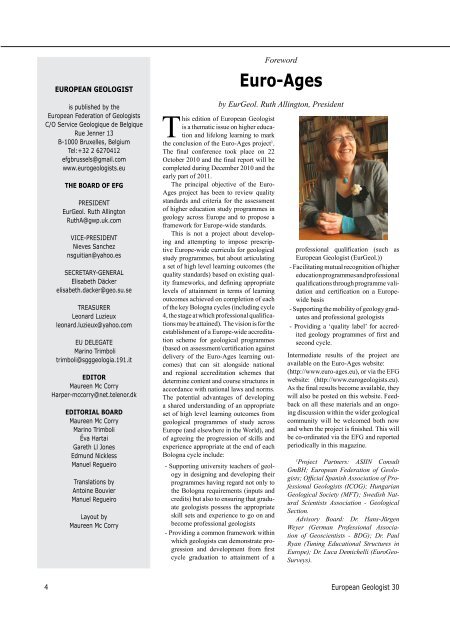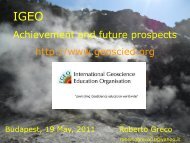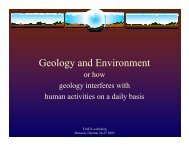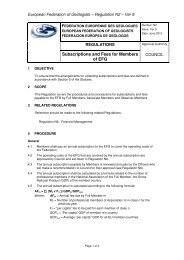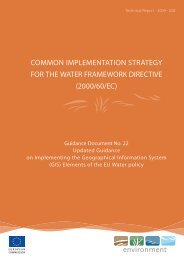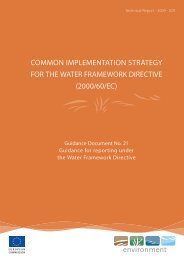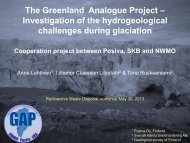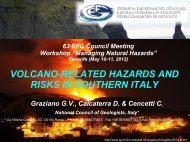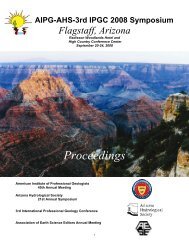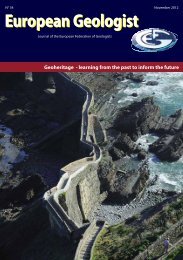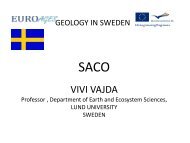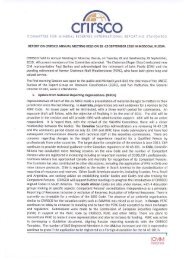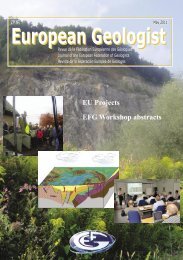EGM 30 download.pdf - European Federation of Geologists
EGM 30 download.pdf - European Federation of Geologists
EGM 30 download.pdf - European Federation of Geologists
You also want an ePaper? Increase the reach of your titles
YUMPU automatically turns print PDFs into web optimized ePapers that Google loves.
EUROPEAN GEOLOGISTis published by the<strong>European</strong> <strong>Federation</strong> <strong>of</strong> <strong>Geologists</strong>C/O Service Geologique de BelgiqueRue Jenner 13B-1000 Bruxelles, BelgiumTel:+32 2 6270412efgbrussels@gmail.comwww.eurogeologists.euTHE BOARD OF EFGPRESIDENTEurGeol. Ruth AllingtonRuthA@gwp.uk.comVICE-PRESIDENTNieves Sancheznsguitian@yahoo.esSECRETARY-GENERALElisabeth Däckerelisabeth.dacker@geo.su.seTREASURERLeonard Luzieuxleonard.luzieux@yahoo.comEU DELEGATEMarino Trimbolitrimboli@sgggeologia.191.itEDITORMaureen Mc CorryHarper-mccorry@net.telenor.dkEDITORIAL BOARDMaureen Mc CorryMarino TrimboliÉva HartaiGareth Ll JonesEdmund NicklessManuel RegueiroTranslations byAntoine BouvierManuel RegueiroLayout byMaureen Mc CorryForewordEuro-Agesby EurGeol. Ruth Allington, PresidentThis edition <strong>of</strong> <strong>European</strong> Geologistis a thematic issue on higher educationand lifelong learning to markthe conclusion <strong>of</strong> the Euro-Ages project 1 .The final conference took place on 22October 2010 and the final report will becompleted during December 2010 and theearly part <strong>of</strong> 2011.The principal objective <strong>of</strong> the Euro-Ages project has been to review qualitystandards and criteria for the assessment<strong>of</strong> higher education study programmes ingeology across Europe and to propose aframework for Europe-wide standards.This is not a project about developingand attempting to impose prescriptiveEurope-wide curricula for geologicalstudy programmes, but about articulatinga set <strong>of</strong> high level learning outcomes (thequality standards) based on existing qualityframeworks, and defining appropriatelevels <strong>of</strong> attainment in terms <strong>of</strong> learningoutcomes achieved on completion <strong>of</strong> each<strong>of</strong> the key Bologna cycles (including cycle4, the stage at which pr<strong>of</strong>essional qualificationsmay be attained). The vision is for theestablishment <strong>of</strong> a Europe-wide accreditationscheme for geological programmes(based on assessment/certification againstdelivery <strong>of</strong> the Euro-Ages learning outcomes)that can sit alongside nationaland regional accreditation schemes thatdetermine content and course structures inaccordance with national laws and norms.The potential advantages <strong>of</strong> developinga shared understanding <strong>of</strong> an appropriateset <strong>of</strong> high level learning outcomes fromgeological programmes <strong>of</strong> study acrossEurope (and elsewhere in the World), and<strong>of</strong> agreeing the progression <strong>of</strong> skills andexperience appropriate at the end <strong>of</strong> eachBologna cycle include:- Supporting university teachers <strong>of</strong> geologyin designing and developing theirprogrammes having regard not only tothe Bologna requirements (inputs andcredits) but also to ensuring that graduategeologists possess the appropriateskill sets and experience to go on andbecome pr<strong>of</strong>essional geologists- Providing a common framework withinwhich geologists can demonstrate progressionand development from firstcycle graduation to attainment <strong>of</strong> apr<strong>of</strong>essional qualification (such as<strong>European</strong> Geologist (EurGeol.))- Facilitating mutual recognition <strong>of</strong> highereducation programmes and pr<strong>of</strong>essionalqualifications through programme validationand certification on a Europewidebasis- Supporting the mobility <strong>of</strong> geology graduatesand pr<strong>of</strong>essional geologists- Providing a ‘quality label’ for accreditedgeology programmes <strong>of</strong> first andsecond cycle.Intermediate results <strong>of</strong> the project areavailable on the Euro-Ages website:(http://www.euro-ages.eu), or via the EFGwebsite: (http://www.eurogeologists.eu).As the final results become available, theywill also be posted on this website. Feedbackon all these materials and an ongoingdiscussion within the wider geologicalcommunity will be welcomed both nowand when the project is finished. This willbe co-ordinated via the EFG and reportedperiodically in this magazine.1Project Partners: ASIIN ConsultGmBH; <strong>European</strong> <strong>Federation</strong> <strong>of</strong> <strong>Geologists</strong>;Official Spanish Association <strong>of</strong> Pr<strong>of</strong>essional<strong>Geologists</strong> (ICOG); HungarianGeological Society (MFT); Swedish NaturalScientists Association - GeologicalSection.Advisory Board: Dr. Hans-JürgenWeyer (German Pr<strong>of</strong>essional Association<strong>of</strong> Geoscientists - BDG); Dr. PaulRyan (Tuning Educational Structures inEurope); Dr. Luca Demichelli (EuroGeo-Surveys).4 <strong>European</strong> Geologist <strong>30</strong>


